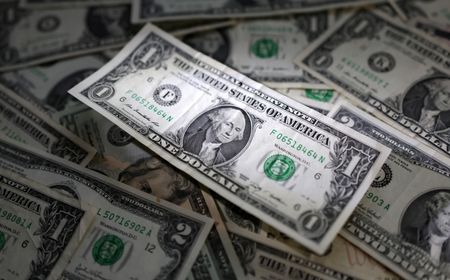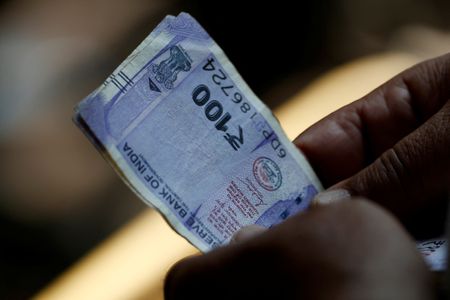By Samuel Indyk and Kevin Buckland
LONDON (Reuters) -The euro wobbled on Thursday as data painted a bleak economic picture, while U.S. fiscal concerns kept the dollar pinned lower against the yen as the U.S. House passed President Donald Trump’s bill for huge tax and spending cuts.
Bitcoin pushed to an all-time high, partly as investors sought out alternatives to U.S. assets.
Trump’s sweeping tax bill, which is set to add to the country’s ballooning debt pile, narrowly passed in the House of Representatives, setting the stage for weeks of debate in the Republican-led Senate.
“The view is that, with this bill, Trump is playing with fire with the deficit,” said Francesco Pesole, FX strategist at ING.
“It’s causing a coordinated sell-off in equities and Treasuries, and the ‘Sell America’ theme is obviously quite negative for the dollar,” Pesole added.
The non-partisan Congressional Budget Office estimates the bill will add $3.8 trillion to the $36.2 trillion in U.S. debt over the next decade.
The dollar slipped as much as 0.5% to 142.80 yen, its weakest level since May 7, but was last little changed at 143.655.
A lacklustre 20-year bond sale on Wednesday reinforced the “Sell America” narrative, weighing not just on the dollar but on Wall Street as well, with traders already jittery after Moody’s cut the triple-A U.S. credit rating last week.
“Trump’s tax bill implies higher deficits and they’ll most likely need to issue more government bonds,” said Sara Midtgaard, senior strategist at Nordea.
“We’re already seeing quite poor demand for U.S. government bonds and I think the bond market will be the main trigger of a weaker dollar going forward.”
The euro, meanwhile, fell 0.3% to $1.1293, after rising 0.4% on Wednesday for a third straight session.
Euro zone business activity unexpectedly contracted this month, HCOB’s preliminary composite Purchasing Managers’ Index showed on Thursday.
“The underwhelming release bodes poorly for the near-term economic prospects on the continent, with the effects of Donald Trump’s tariffs slowly feeding through and the spectre of a trade deal seemingly unlikely at this juncture,” said Harry Woolman, analyst at Validus Risk Management.
Sterling was little changed at $1.3414 but remained close to a three-year peak reached on Wednesday after hot inflation dampened expectations for rate cuts from the Bank of England.
The dollar index, which measures the U.S. currency against six peers, was up just shy of 0.2% at 99.77, a little above yesterday’s two-week low of 99.333.
Bitcoin climbed as high as $111,862.98, a fresh all-time peak and a 3.3% increase from Wednesday’s close.
“Bitcoin is fast approaching $112,000 and trading at a new record as hopes increase that stablecoin regulation will soon pass after the advancement of legislation yesterday,” said Jim Reid, global head of macro and thematic research at Deutsche Bank in a note.
“The U.S. debt instability has probably helped too.”
(Reporting by Samuel Indyk and Kevin Buckland; Editing by Edmund Klamann, Alex Richardson and Ed Osmond)









